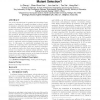Free Online Productivity Tools
i2Speak
i2Symbol
i2OCR
iTex2Img
iWeb2Print
iWeb2Shot
i2Type
iPdf2Split
iPdf2Merge
i2Bopomofo
i2Arabic
i2Style
i2Image
i2PDF
iLatex2Rtf
Sci2ools
103
click to vote
ICSE
2010
IEEE-ACM
2010
IEEE-ACM
Is operator-based mutant selection superior to random mutant selection?
Due to the expensiveness of compiling and executing a large number of mutants, it is usually necessary to select a subset of mutants to substitute the whole set of generated mutants in mutation testing and analysis. Most existing research on mutant selection focused on operator-based mutant selection, i.e., determining a set of sufficient mutation operators and selecting mutants generated with only this set of mutation operators. Recently, researchers began to leverage statistical analysis to determine sufficient mutation operators using execution information of mutants. However, whether mutants selected with these sophisticated techniques are superior to randomly selected mutants remains an open question. In this paper, we empirically investigate this open question by comparing three representative operator-based mutant-selection techniques with two random techniques. Our empirical results show that operator-based mutant selection is not superior to random mutant selection. These res...
| Added | 19 Jul 2010 |
| Updated | 19 Jul 2010 |
| Type | Conference |
| Year | 2010 |
| Where | ICSE |
| Authors | Lu Zhang, Shan-Shan Hou, Jun-Jue Hu, Tao Xie, Hong Mei |
Comments (0)

